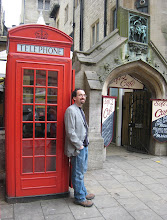Last night my friends Bernd Rosenow and Stephan Schmult took me out on the town in Stuttgart. Bernd has two young children and admitted that this was his first time going out on a Friday night since he arrived in Stuttgart last year. Stephan, on the other hand, is almost famous for being a party animal. He was a postdoc in my department back at Bell Labs and tales of his exploits (usually involving Nascar and gallons of beer) were still being told several years after he returned to Germany. He considers himself to be half german and half redneck American – his favorite beer is Coors light - and he knows pretty much every bar in the Stuttgart, as well as every cut-rate liquor store along route 22 in New Jersey. If the German/Redneck combination isn’t surprising enough, consider that he is also probably the world’s fifth best high mobility Galium Arsenide grower – no small achievement.
At any rate, the bar we went to last night was actually pretty nice: it was part-indoors-part-outdoors, had cool music, and was completely packed until very late. We finally left at around 2:15 am.
Although they showed me a very nice time in their city, there are certainly more interesting cities in Germany (Berlin and Cologne come to mind). However, if you are interested in my kind of Science, the Max-Planck-Institut für Festkörperforschung in Stuttgart is a pretty amazing place. (Festkörperforschung means Solid State Research, I think – isn’t it great how in German you can cram three words into one? I wonder what the longest word is in the german language.).
Unfortunately, it was a holiday week here in Germany, so the institute was a bit quieter than usual. I was happy though that Herr Doctor Professor Lab Director Nobel Laureate Klaus Von Klitzing (who is considered the father of my entire field of research) did make it to the lecture I gave, and he even seemed to enjoy listening to it. (Von Klitzing is a very social guy in person, but when listening to lectures he is famously quiet and very hard to read).
On the subject of Von Klitzing and the Max Planck directorship:
\begin{rumormongering}
Von Klitzing is now rapidly approaching retirement age and everyone is wondering who will be the next director of the institute. The job was offered to Andrew Geim (discoverer of Graphene), who turned it down. Speculation is that Klaus Ensslin might be offered it also, but he already has a pretty sweet job at ETH in Zurich and it isn’t clear that he would view this as a step up. Beyond that, no one seems to have any idea who else is being considered. Anyone know anything?
\end{rumormongering}
Because of the holiday week, a few of the key players at the institute were not around. I was particularly disappointed that Igor Kukushkin was not in town. Although I’ve heard his name around the community for years, and I’ve even heard other people talk about some of his nice work, I’ve never actually met him. I had been looking forward to asking him a bunch of questions about his work and also congratulating him on his recent article in Science Magazine – which I liked a lot – so much so that I wrote an enthusiastic perspectives piece (here) about the experiment which was published in the same issue of Science (My one page piece is supposed to be reasonably accessible to readers of Science – I’m not sure it really is though – you can try reading it and let me know what you think).
Although I did chat with quite a few of the experimentalists there (Stephan Schmult and Jurgen Smet in particular), most of my time was spent talking to my collaborator Bernd Rosenow. Our little gang-of-four collaborators (Bernd, Myself, Ady Stern (see here also), and my graduate thesis adviser Bert Halperin) just posted a paper on the online physics arxive this week. We were extremely close to getting scooped by the Microsoft group who was working on the same topic, obtained the same result via a different method, and posted their result on the same day. Even though we had found the result almost two years ago (Well, actually it was Bernd who made the breakthought) we were slow to write it up because we didn’t think there was much chance that anyone else was (a) thinking about the problem in depth and (b) able to figure out how to solve it. We were wrong on both counts. At any rate, Bernd and I, having narrowly escaped being scooped, spent most of my visit trying to push to completion various other projects where we also thought we had a solid headstart, but maybe we don’t.
Subscribe to:
Post Comments (Atom)

No comments:
Post a Comment